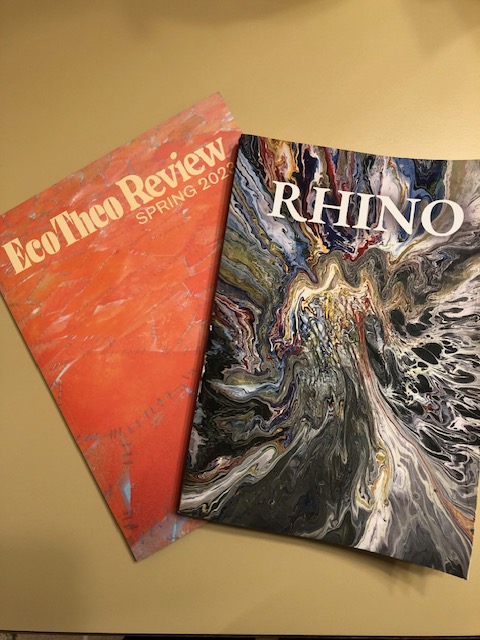Please join me for An Evening with Local Poets on Tuesday, April 16th, 6-7 p.m. at Village Books in Fairhaven. I’ll be reading and talking poetry alongside Linda Conroy, Ryler Dustin, and Jeremy Voigt.
Below are details about the whole slate of readings and workshops Village Books is hosting during National Poetry Month. (I’ve copied in this webpage below, but the links aren’t live, so please click this link to access the live version where you can register for the events.)
The bookstore charges $5 per ticket, which becomes a voucher toward any purchase on the day of the event. Here’s the link to pre-register: https://www.eventbrite.com/e/an-evening-with-poets-tickets-851119951687. I hope to see you there!
Poetry Fest

April is National Poetry Month, and we’re celebrating with a plethora of poets!
Poetry Fest is a month of readings, events, workshops, and general celebration of poetry and local poets.
Events
These events will be in the Readings Gallery of our Fairhaven store. Pre-registration required.
An Afternoon with Local Poets
Sunday, April 14, 4pm-5pm
Readings and discussion with local poets Jeffrey Morgan, Jessica Gigot, and Kevin Murphy.
Click here to register for this event!
An Evening with Local Poets
Tuesday, April 16, 6pm-7pm
Readings and discussion with local poets Jennifer Bullis, Jeremy Voigt, Linda Conroy, and Ryler Dustin.
Click here to register for this event!
See our Events Calendar for visiting poets, including Kwame Alexander, Subhaga Crystal Bacon, Mary Lou Kayser, and Anastacia-Reneé!
Poetry Workshops
All workshops will be in the Readings Gallery of our Fairhaven store unless otherwise noted. Pre-registration required
Writing Into the Unknown
with Kevin Murphy
Saturday April 6, 3pm-4:30pm
Write what you don’t know! In this workshop, we’ll explore the ways poetry can provide access to the unconscious, the dream world, the irrational and the taboo. We’ll experiment with forms and exercises to spark the imagination and open the door to mystery and surprise.
Click here to register for this workshop!
Finishing the Unfinishable Poem
with Jeffrey Morgan
Monday April 8, 6pm-7:30pm
From large considerations such as theme and form to small ones like word choice and punctuation, in this workshop we’ll explore staple techniques and tricks of the revision process. Come prepared to write, revise, and share your work!
Click here to register for this workshop!
Writing in Forms and Free Verse
with Linda Conroy
Saturday April 13, 2pm-3:30pm
Have you wondered if you should write free or formal verse poetry, and been unsure of what makes each style effective? In this workshop you will learn the appeal and satisfaction, as well as the challenges, of each and try your hand at writing and enjoying the best elements of both.
Click here to register for this workshop!
How to Write a Poem About a Rock (and Everything Else)
with Luther Allen
Thursday April 17, 6pm-7:30pm
How to Write a Poem About a Rock (and Everything Else). A generative workshop for ages 10 to 110, for people who have never written a poem before or people with an MFA. We will explore your sharpened conscious and subconscious (!) minds to find a poem that wants to be written. Bring 3 or 4 sheets of lined paper, a pen or pencil, a pair of scissors, and a clipboard (and maybe some scotch tape) – and you will leave with a startling fresh and incisive poem.
Click here to register for this workshop!
Writing Erasure Poems
with Subhaga Crystal Bacon
Friday April 19, 10:30am-12pm
The erasure poem starts with a printed document from which the poet removes words to reveal a new, more concise or even more true message hidden within the original text. This form has been used to great effect by many poets, notably Nicole Sealey in Ferguson, an erasure of the Department of Justice’s Ferguson Report on police racism in Ferguson, MO. Poet torrin a. greathouse, a transgender cripple-punk poet has manipulated the traditional Japanese haibun using redaction, the process of blacking out language in a text to reveal a new message. Visual poets such as JI Kleinberg, Koss La and others make art from torn out, or painted or drawn-over language from texts. In this workshop, we’ll explore some of these samples and get you started creating your own erasure poem(s). Bring a couple of printed documents you’d like to explore through erasure or redaction. Newspaper, magazine, or book pages work great. If you’d like to work digitally, bring a laptop or tablet with some documents bookmarked.
Click here to register for this workshop!
Mothering as Transformation: a Poetic Journey
with Jessica Gigot
Sunday April 21, 4pm-5:30pm
Writing poetry about mothers and the experience of motherhood is not easy because the act of mothering/being mothered is both beautiful and complicated. As more writers explore the lessons unique to this deeply personal passage and bond, the audience for motherhood poetry expands. In this generative workshop, we will explore motherhood/mothering as transformation, read from a diverse selection of mother-poets, and discuss how and why motherhood matters are relevant to all readers. Half of the workshop fee will be donated to Every Mother Counts.



